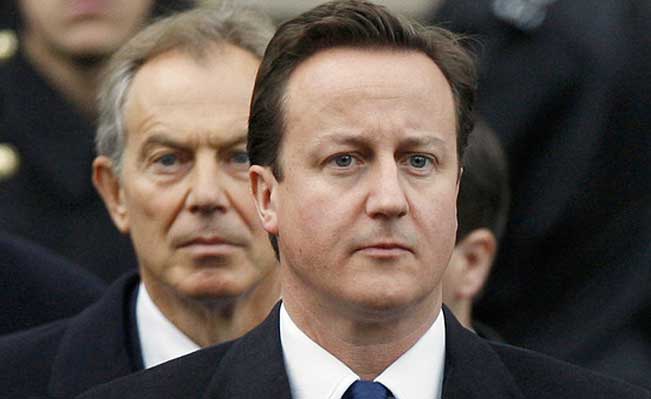 Blair and Cameron at the Cenotaph. Photo: Kirsty Wigglesworth/Associated Press
Blair and Cameron at the Cenotaph. Photo: Kirsty Wigglesworth/Associated Press
The Gaza protests, BDS boycotts, the campaign to break the UK government’s links with Israel and the anti Nato protests are all connected. We need a joined up opposition argues Lindsey German
Last summer’s foreign policy crisis gave David Cameron one of his biggest political headaches, when MPs voted against intervention in Syria.
Now his August is again being disturbed by the Israeli onslaught on Gaza, and by the wave of protest and anger that has surfaced as a result.
August was also a cruel month for Tony Blair, whose backing for Israel’s attack on Lebanon in 2006 marked the beginning of the end of his premiership.
The resignation of Baroness Warsi from the government over its policy on Gaza – which she called “morally indefensible” – is a reflection of wider public disquiet and of the effect on MPs of the protests and lobbying that has gone on.
There have been calls from Plaid Cymru and Labour MPs for a recall of parliament, questioning how MPs can be on holiday when nearly 2,000 Gazan civilians have already been killed and much of the area destroyed while David Cameron still justifies the Israelis ‘defending themselves’.
A government which sells arms to Israel, which continues to back Tony Blair as peace envoy in the Middle East, and which has found serial defences for Israel’s deliberate targeting of civilians, is now under pressure to respond to widespread concern on this issue.
At the very least parliament should be recalled for an emergency debate where MPs can discuss an arms embargo and sanctions on Israel.
Cameron was happy enough to recall parliament last August just days before its scheduled return to try to launch airstrikes on Syria. That moves backfired badly, and there are growing signs of deep discontent with government foreign policy.
It is hardly surprising. Afghanistan remains mired in war and corruption. The consequences of intervention in Iraq and Libya have been disastrous. The advance of ISIS in Iraq means the country has effectively broken up. The Royal Navy had to send a ship to evacuate British citizens as embassies closed amid inter-militia fighting in Libya. There is effectively no central state or civil society three years after intensive Nato bombing, cheered on by Cameron, led to 30,000 deaths and virtually continuous war since.
The consecutive failure of the foreign policy interventions of the past 13 years would have led most people to think again. Not Cameron, Blair and the rest of the crew. They continue to promote future wars.
Given that the process of reordering the Middle East has been such an abysmal failure, the Cameron touch is now being applied to Eastern Europe. Nato exercises in Poland and the Baltic states are part of the summer agenda while the Ukrainian government pounds civilians in the east of the country, unremarked and unnoticed by much of the world.
The protests over Gaza have to be about much more than ending this latest attack. They have to be about ending the siege, building the BDS boycott campaign, and the breaking the UK government’s links with Israel.
And they have to roll over into the anti Nato protests in south Wales at the end of August. Because if there is one thing we have learnt over these past 13 years it is this: these issues are all connected and they need joined up opposition to them.

